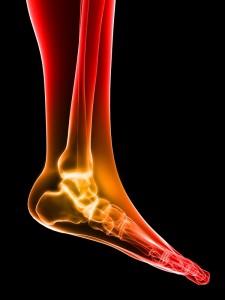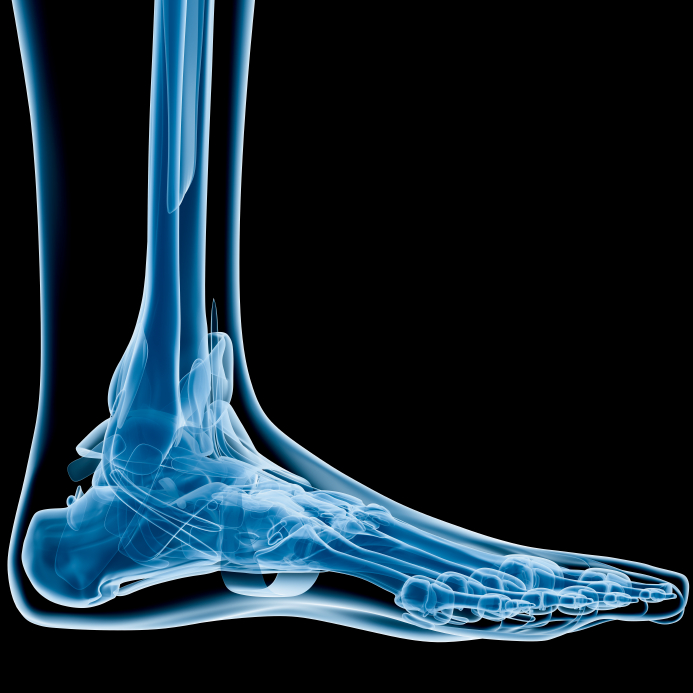 Every part of the body requires special care and attention to ensure optimal function and maintain good health, but the feet demand an extra degree of focused care. Feet are under constant stress, supporting the body at its base and controlling the fundamentals of locomotion. AOSMI’s statistics suggest that 80% of adults will experience some type of pain or disability in their feet that affects quality of life. Feet can suffer wear and tear from a wide variety of situations. Many occupations demand that employees stay on their feet for long periods of time: from construction and medical trades to food service, a high percentage of workers spend time on their feet every day. Sports injury and other accidents can also be a major influence on the long-term health of the feet. Even some chronic health conditions can be a concern when it comes to preserving mobility and stability.
Every part of the body requires special care and attention to ensure optimal function and maintain good health, but the feet demand an extra degree of focused care. Feet are under constant stress, supporting the body at its base and controlling the fundamentals of locomotion. AOSMI’s statistics suggest that 80% of adults will experience some type of pain or disability in their feet that affects quality of life. Feet can suffer wear and tear from a wide variety of situations. Many occupations demand that employees stay on their feet for long periods of time: from construction and medical trades to food service, a high percentage of workers spend time on their feet every day. Sports injury and other accidents can also be a major influence on the long-term health of the feet. Even some chronic health conditions can be a concern when it comes to preserving mobility and stability.
AOSMI, one of the foremost orthopedic practices in NJ and a resource for the medical community at large, currently counts multiple experts in podiatry among its acclaimed staff. Our orthopedic specialists can provide insight, identify both short-term problems and long-term concerns, and carry out treatment for a wide variety of possible issues. Browse our pages on podiatry to find out more.
 At Advanced Orthopedics and Sports Medicine Institute, providing the highest standard of care to every individual patient is our top priority. Our professionals work tirelessly to ensure that each procedure not only treats injuries and restores function, but also rebuilds confidence, inspires a sense of security, and creates trust. We regularly receive positive feedback and find testimonials from our patients on the Internet, where we continue our conversations about prevention, treatment, and rehabilitation. One such testimonial, on the blog Iconic Talks, highlights the personal focus and expert skill employed daily at our practice.
At Advanced Orthopedics and Sports Medicine Institute, providing the highest standard of care to every individual patient is our top priority. Our professionals work tirelessly to ensure that each procedure not only treats injuries and restores function, but also rebuilds confidence, inspires a sense of security, and creates trust. We regularly receive positive feedback and find testimonials from our patients on the Internet, where we continue our conversations about prevention, treatment, and rehabilitation. One such testimonial, on the blog Iconic Talks, highlights the personal focus and expert skill employed daily at our practice.
The author of the post discusses his reaction to a torn Achilles tendon and outlines how the staff at AOSMI helped him first to come to terms with the setback and then to overcome it. While receiving care for the injury, the patient discovered that a Physician Assistant on our staff was a friend he’d previously met in the community. This personal connection is emblematic of the approach our orthopedic specialists use when helping patients through serious injury. The author also speaks to the singular talent of AOSMI surgeon Dr. James F. Cozzarelli, whose skills combined with attentive personal care to transform a distressing event into a comfortable and unforgettable positive experience:
My injury may have sidelined me for 6-months or so but knowing I have a a professional and friend like Dan makes it much easier to say I’m injured, but I’m not hurt. Thanks to Advanced Orthopedics and Sports Medicine Institute, you guys get the MVP for service, quality and compassion.
The full article is available at Iconic Talks, complete with more information about AOSMI from the patient’s perspective: a smart read for anyone who wants to learn more about our practice, its services, and its team of dedicated professionals.
 What are the signs of a fracture (broken bone) in the foot? Severe pain, swelling and redness are the obvious answers. Many fractures occur when the something traumatic happens to the foot. For example, a heavy box dropping on it or falling down stairs can cause foot fractures. However, not all foot fractures are obvious. A stress fracture is a type of fracture that may not have much bruising. In fact, the signs of a stress fracture may not be noticeable at first to many people.
What are the signs of a fracture (broken bone) in the foot? Severe pain, swelling and redness are the obvious answers. Many fractures occur when the something traumatic happens to the foot. For example, a heavy box dropping on it or falling down stairs can cause foot fractures. However, not all foot fractures are obvious. A stress fracture is a type of fracture that may not have much bruising. In fact, the signs of a stress fracture may not be noticeable at first to many people.
Stress fractures are not caused by one single incident. They usually happen over many days, weeks or months. Stress fractures occur when too much stress (force) is put on a bone that cannot handle it. The stress can include common activities such as running, dancing, exercising and marching. This type of fracture can happen to anyone, but it is seen a lot in athletes and “weekend warriors”. Weekend warriors are people who are mostly non-active during the normal workweek, and then use the weekend as the time to overindulge in exercise or weightlifting. As stated before a stress fracture will not have much bruising, but there will be some swelling. The pain of a stress fracture is not as severe as the pain cause by a traumatic fracture. Stress fracture pain can be thought of as an annoying ache. The pain gets worse with activity and improves with rest. To get an exact diagnosis, your podiatrist will order an X-ray or an MRI.
Treatment of a stress fracture doesn’t usually involve surgery. The injury will need to be immobilized and this is typically done with a cast. Resting the injury is very important. The length of the resting period depends on the bones involved in the stress injury and how severe the injury is. If you want to heal fully, follow ALL the directions of your podiatrist. Trying to be active too soon, could lead to another stress fracture. Once the resting period is over, you will need to slowly return to activity. Your podiatrist may even recommend rehabilitation. To help prevent injuring your foot again, your podiatrist can use tapping, pads, or create orthotics for you.
Stress fractures can be annoying especially if you are a person that likes to stay active. The important thing is to see your podiatrist for a definite diagnosis and to give yourself time to heal. Healing can take several weeks, but be patient. Being too eager to get back to your regular routine can cause complications and prolong your healing time. With so much going on in your life, who wants to be in a cast? Certainly, not you! Do yourself a favor and see your podiatrist about that achy pain in your foot —the sooner the better.
 Advanced Orthopedics and Sports Medicine Institute is widely known in its area as the foremost authority on sports medicine, joint health, and all other aspects of orthopedic care. To preserve and even improve upon this reputation, our practice seeks out the best talent in the field and recruits top professionals to join our care community. We’re honored to welcome Dr. Alison DeWaters, DPM, a foot and ankle surgery specialist, to Advanced Orthopedics and Sports Medicine Institute. Dr. DeWaters’s specialties include forefoot reconstructive surgery including bunions and hammertoes as well as arthroscopic ankle repair, diabetic footcare and surgical salvage, reconstruction of foot and ankle deformities both pediatric and congenital, and complex deformities of the foot and ankle found in mature adults.
Advanced Orthopedics and Sports Medicine Institute is widely known in its area as the foremost authority on sports medicine, joint health, and all other aspects of orthopedic care. To preserve and even improve upon this reputation, our practice seeks out the best talent in the field and recruits top professionals to join our care community. We’re honored to welcome Dr. Alison DeWaters, DPM, a foot and ankle surgery specialist, to Advanced Orthopedics and Sports Medicine Institute. Dr. DeWaters’s specialties include forefoot reconstructive surgery including bunions and hammertoes as well as arthroscopic ankle repair, diabetic footcare and surgical salvage, reconstruction of foot and ankle deformities both pediatric and congenital, and complex deformities of the foot and ankle found in mature adults.
A member of numerous associations including the American Podiatric Medical Association and the New Jersey Podiatric Medical Association, Dr. DeWaters is highly accredited in the field and brings a history of success to AOSMI. She currently teaches foot and ankle surgery to medical students and residents, helping to raise the standard of care throughout the field. Voted “One of the Best Podiatrists” by the Asbury Park Press, Dr. DeWaters is respected by colleagues and trusted by patients throughout the region. To find out more about this new arrival in our community or contact Dr. DeWaters, visit us online today at AOSMI.
 Foot injuries often occur when the feet are subjected to vigorous and repetitive overuse or trauma resulting from auto or work accidents. Prolonged standing on inflexible surfaces or excessive running can inflame the plantar fasciitis tissues that extend to form the foot’s arch. Injury to the medial longitudinal arch, one of three arches vital to supporting the foot, may happen when the arch suffers an abnormal twisting motion or the posterior tibialis muscle is injured and fails to provide extraneous support to the MLA. An overworked MLA muscle can also cause foot pain known as posterior tibial tendon dysfunction, which is accompanied by poor arch support and general foot fatigue during intense physical activity.
Foot injuries often occur when the feet are subjected to vigorous and repetitive overuse or trauma resulting from auto or work accidents. Prolonged standing on inflexible surfaces or excessive running can inflame the plantar fasciitis tissues that extend to form the foot’s arch. Injury to the medial longitudinal arch, one of three arches vital to supporting the foot, may happen when the arch suffers an abnormal twisting motion or the posterior tibialis muscle is injured and fails to provide extraneous support to the MLA. An overworked MLA muscle can also cause foot pain known as posterior tibial tendon dysfunction, which is accompanied by poor arch support and general foot fatigue during intense physical activity.
Because the foot has hundreds of tiny bones and masses of soft tissues, a successful approach to foot pain demands accurate diagnoses and appropriate treatment methods provided by Advanced Orthopedics. We specialize in conservative and surgical treatments that are client-focused and consistent with orthopedic protocol involving therapeutic massage, acupuncture, steroid injections or shock wave therapy, an innovative treatment specifically designed to relieve heel pain.
Top-flight orthopedic surgeons at Advanced Orthopedics can also perform several types of foot surgeries to restore normal functioning of the feet and relieve pain so that clients no longer need to take medications, wear casts or suffer gait problems that may cause other musculoskeletal conditions.







